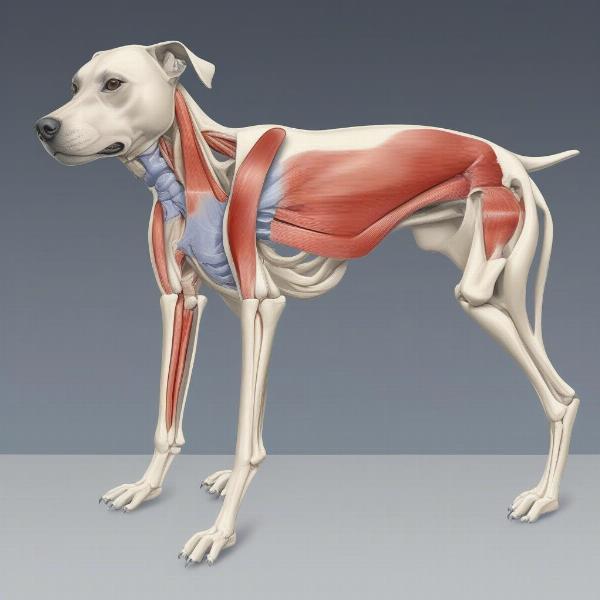Hip and joint supplements for dogs are becoming increasingly popular amongst pet owners seeking to improve their furry friends’ mobility and comfort, particularly in senior dogs or those prone to joint issues. Understanding the different types of supplements, their potential benefits, and how to choose the right one for your dog can be overwhelming. This guide provides a comprehensive overview of hip and joint supplements, empowering you to make informed decisions about your dog’s joint health.
Understanding Canine Joint Health
 Dog Joint Anatomy
Dog Joint Anatomy
Just like humans, dogs can experience joint pain and stiffness due to various factors, including age, breed predisposition, injuries, and underlying conditions like osteoarthritis. As dogs age, the cartilage cushioning their joints can wear down, leading to inflammation and discomfort. Large or giant breeds are particularly susceptible to hip and elbow dysplasia, which can further compromise joint health.
Types of Hip and Joint Supplements for Dogs
A variety of hip and joint supplements are available, each with its own mechanism of action and potential benefits. Some common ingredients include:
- Glucosamine and Chondroitin: These building blocks of cartilage help support joint structure and function.
- MSM (Methylsulfonylmethane): This organic sulfur compound has anti-inflammatory properties and may help reduce pain and stiffness.
- Omega-3 Fatty Acids: Found in fish oil, these essential fatty acids can help reduce inflammation and support joint health.
- Hyaluronic Acid: This substance naturally occurs in joint fluid and helps lubricate the joints, promoting smooth movement.
- Green-Lipped Mussel: This natural source of omega-3s and other nutrients can help reduce inflammation and support joint health.
Choosing the Right Supplement for Your Dog
Selecting the most suitable hip and joint supplement for your dog depends on several factors, including their age, breed, size, specific joint issues, and overall health. It’s crucial to consult with your veterinarian before starting any new supplement regimen. They can help you assess your dog’s individual needs and recommend appropriate products.
Administering Hip and Joint Supplements
Most hip and joint supplements are available in chewable tablets, capsules, or powders that can be mixed with food. Follow the manufacturer’s instructions carefully for proper dosage and administration. Consistency is key when it comes to seeing results, so establish a regular routine for giving your dog their supplements.
The Importance of a Holistic Approach
While hip and joint supplements can play a valuable role in supporting your dog’s joint health, they should be part of a comprehensive approach. Maintaining a healthy weight, providing regular low-impact exercise, and ensuring a comfortable sleeping area can all contribute to improved joint health and mobility. For senior dogs slipping on the floor, consider using rugs or mats to provide better traction. You can also find a harness for dogs with arthritis to offer additional support during walks. senior dog slipping on floor
Are Hip and Joint Supplements Safe for My Dog?
Most hip and joint supplements are considered safe for dogs when administered as directed. However, some dogs may experience mild side effects, such as digestive upset. dogs hind legs Always consult your veterinarian before starting your dog on any new supplement, especially if they have pre-existing health conditions or are taking other medications. Some pet owners have found success with specific supplements like Cortaflex or rosehip oil. cortaflex for dogs rosehip oil for dogs
Conclusion
Hip and joint supplements can be a valuable tool in supporting your dog’s mobility and comfort, particularly for those experiencing age-related joint issues or specific joint conditions. By understanding the different types of supplements available and working closely with your veterinarian, you can help your dog enjoy a more active and pain-free life. harness for dogs with arthritis
FAQ
- How long does it take to see results from hip and joint supplements? Most pet owners report noticeable improvements within 4-6 weeks of consistent use.
- Can I give my dog human joint supplements? No, human joint supplements may contain ingredients that are toxic to dogs. Always choose supplements specifically formulated for canines.
- Are there any natural alternatives to hip and joint supplements? Some natural remedies, such as turmeric and ginger, may offer anti-inflammatory benefits. Discuss these options with your veterinarian.
- What are the signs of joint pain in dogs? Signs include limping, stiffness, reluctance to exercise, difficulty getting up or down, and whining or yelping when touched.
- Are there any breeds more prone to joint problems? Large and giant breeds, such as German Shepherds, Labrador Retrievers, and Great Danes, are more susceptible to joint issues like hip and elbow dysplasia.
- Can diet affect my dog’s joint health? Yes, maintaining a healthy weight is crucial for joint health. Obesity puts added stress on joints, increasing the risk of pain and damage.
- What kind of exercise is best for dogs with joint problems? Low-impact activities like swimming, short walks, and gentle play are ideal. Avoid high-impact activities that can strain the joints.
ILM Dog is your trusted source for expert advice on dog care and wellbeing. We offer a range of resources covering breed selection, health and medical care, training and behavior, nutrition, grooming, and much more. For personalized guidance on hip and joint supplements or any other aspect of dog care, contact our team of experts. Email: [email protected]. Phone: +44 20-3965-8624. ILM Dog is committed to providing you with the information and support you need to keep your canine companion healthy and happy.